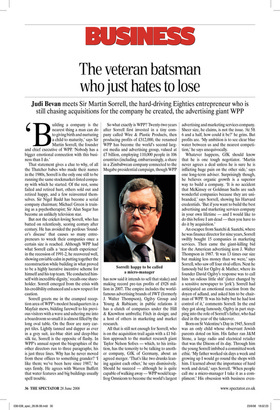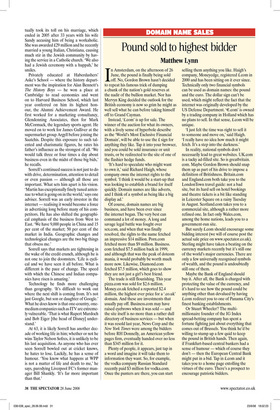The veteran batsman who just hates to lose
Judi Bevan meets Sir Martin Sorrell, the hard-driving Eighties entrepreneur who is still chasing acquisitions for the company he created, the advertising giant WPP ‘Building a company is the nearest thing a man can do to giving birth and nurturing a child to maturity,’ says Sir Martin Sorrell, the founder and chief executive of WPP. ‘Nobody has a bigger emotional connection with this business than I do.’ That statement gives a clue to why, of all the Thatcher babes who made their names in the 1980s, Sorrell is the only one still to be running the same stockmarket-listed company with which he started. Of the rest, some failed and retired hurt, others sold out and retired happy, and a few reinvented themselves. Sir Nigel Rudd has become a serial company chairman; Michael Green is training as a psychotherapist; Sir Alan Sugar has become an unlikely television star.
But not the cricket-loving Sorrell, who has batted on relentlessly, scoring century after century. He has avoided the perilous ‘founder’s disease’ that causes so many entrepreneurs to wreck their companies once a certain size is reached. Although WPP had what Sorrell calls a ‘near-death experience’ in the recession of 1991-2, he recovered well, showing enviable calm in putting together the reconstruction while building in what proved to be a highly lucrative incentive scheme for himself and his top team. ‘He conducted himself with incredible dignity,’ recalls one shareholder. Sorrell emerged from the crisis with his credibility enhanced and a new respect for caution.
Sorrell greets me in the cramped reception area of WPP’s modest headquarters in a Mayfair mews, bidding farewell to his previous visitors with a wave and ushering me into a boardroom so small it is almost filled by the long oval table. On the floor are navy carpet tiles. Lightly tanned and dapper as ever in a grey suit, ice-blue shirt and deep-blue silk tie, Sorrell is the opposite of flashy. In WPP’s annual report the biographies of the other directors run to three paragraphs; his is just three lines. Why has he never moved from these offices to something grander? ‘I like them; we’ve been here since 1987,’ he says firmly. He agrees with Warren Buffett that water features and big buildings usually spell trouble. So what exactly is WPP? Twenty-two years after Sorrell first invested in a tiny company called Wire & Plastic Products, then producing profits of £312,000, the renamed WPP has become the world’s second largest media and advertising group, valued at £7 billion, employing 110,000 people in 106 countries (including, embarrassingly, a share in a Zimbabwean company connected to the Mugabe presidential campaign, though WPP has now said it intends to sell that stake) and making record pre-tax profits of £928 million in 2007. The empire includes the worldfamous advertising brands of JWT (formerly J. Walter Thompson), Ogilvy Group and Young & Rubicam; in public relations it has a clutch of companies under the Hill & Knowlton umbrella; Fitch in design; and a host of others in marketing and market research.
All that is still not enough for Sorrell, who is on the acquisition trail again with a £1 billion approach to the market research giant Taylor Nelson Sofres — which, to his irritation, has the temerity to be talking to another company, GfK of Germany, about an agreed merger. ‘That’s like two drunks leaning against each other,’ he says dismissively. Should he succeed — although he is quite capable of walking away — WPP would leapfrog Omnicom to become the world’s largest advertising and marketing services company. Sheer size, he claims, is not the issue. ‘At 5ft 6 and a half, how could it be?’ he grins. But profits are. ‘My ambition is to see clear blue water between us and the nearest competition,’ he says unequivocally.
Whatever happens, GfK should know that he is one tough negotiator. ‘Martin never agrees a deal unless he is sure he is inflicting huge pain on the other side,’ says one long-term adviser. Surprisingly though, he believes organic growth is a superior way to build a company. ‘It is no accident that McKinsey or Goldman Sachs are such wonderful companies because they are unibranded,’ says Sorrell, showing his Harvard credentials. ‘But if you want to build the best advertising and marketing services company in your own lifetime — and I would like to do this before I am dead — then you have to do it by acquisition.’ An escapee from Saatchi & Saatchi, where he was finance director for nine years, Sorrell swiftly bought 15 companies in marketing services. Then came the giant-killing bid for the American advertising icon J. Walter Thompson in 1987. ‘It was 13 times our size but making less money than we were,’ says Sorrell, who saw off four rival offers. Next he famously bid for Ogilvy & Mather, where its founder David Ogilvy’s response was to call him ‘an odious little shit’ (later changed by a sensitive newspaper to ‘jerk’). Sorrell had anticipated an emotional reaction from the doyen of adland, and asked him to be chairman of WPP. ‘It was his baby but he had lost control of it,’ comments Sorrell. In the end they got along famously, Ogilvy in part stepping into the role of Sorrell’s father, who had died in the year of the takeover.
Born on St Valentine’s Day in 1945, Sorrell was an only child whose observant Jewish parents doted on him. His father ran J&M Stone, a large radio and electrical retailer that was the Dixons of its day. Through him the young Sorrell imbibed a committed work ethic. ‘My father worked six days a week and growing up I would go round the shops with him. I learned about the importance of hard work and detail,’ says Sorrell. ‘When people call me a micro-manager I take it as a compliment.’ His obsession with business even tually took its toll on his marriage, which ended in 2005 after 33 years with his wife Sandy accusing him of being a workaholic. She was awarded £29 million and he recently married a young Italian, Christiana, causing much stir in the Jewish community by having the service in a Catholic church. ‘We also had a Jewish ceremony with a huppah,’ he smiles.
Privately educated at Haberdashers’ Aske’s School — where the history department was the inspiration for Alan Bennett’s The History Boys — he won a place at Cambridge to read economics and went on to Harvard Business School, which last year conferred on him its highest honour, the Alumni Achievement Award. He first worked for a marketing consultancy, Glendenning Associates, then for Mark McCormack, the legendary sports agent. He moved on to work for James Gulliver at the supermarket group Argyll before joining the Saatchis. Despite this exposure to such talented and charismatic figures, he rates his father’s influence as the strongest of all. ‘We would talk three or four times a day about business even in the midst of those big bids,’ he recalls.
Sorrell’s continued success is not just to do with drive, determination, attention to detail or even passion — although all those are important. What sets him apart is his vision. ‘Martin has exceptionally finely tuned antennae to what is going on in the world,’ says one adviser. Sorrell was an early investor in the internet — realising it would become a force in advertising long before many of his competitors. He has also shifted the geographical emphasis of the business from West to East. ‘We have 9,000 people in China and 15 per cent of the market; 50 per cent of the market in India. Geographic changes and technological changes are the two big things that obsess me.’ Sorrell says that markets are tightening in the wake of the credit crunch, although he is not one to join the doomsters. ‘Life is cyclical and we have seen it all before. What is different is the pace of change. The speed with which the Chinese and Indian companies have risen is amazing.’ Technology he finds more challenging than geography. ‘It’s difficult to work out where the next shift is coming from. It’s not just Google, but son or daughter of Google.’ What he does know is that one-country, onemedium companies such as ITV are extremely vulnerable. ‘That is what Rupert Murdoch and Bob Eiger [the head of Disney] understand.’ At 63, it is likely Sorrell has another decade of working life in him; whether or not he wins Taylor Nelson Sofres, it is unlikely to be his last acquisition. As anyone who has ever seen Sorrell bowled out at cricket knows, he hates to lose. Luckily, he has a sense of humour. ‘You know what happens at WPP is not a matter of life and death to me,’ he says, parodying Liverpool FC’s former manager Bill Shankly. ‘It’s far more important than that.’



















































































 Previous page
Previous page